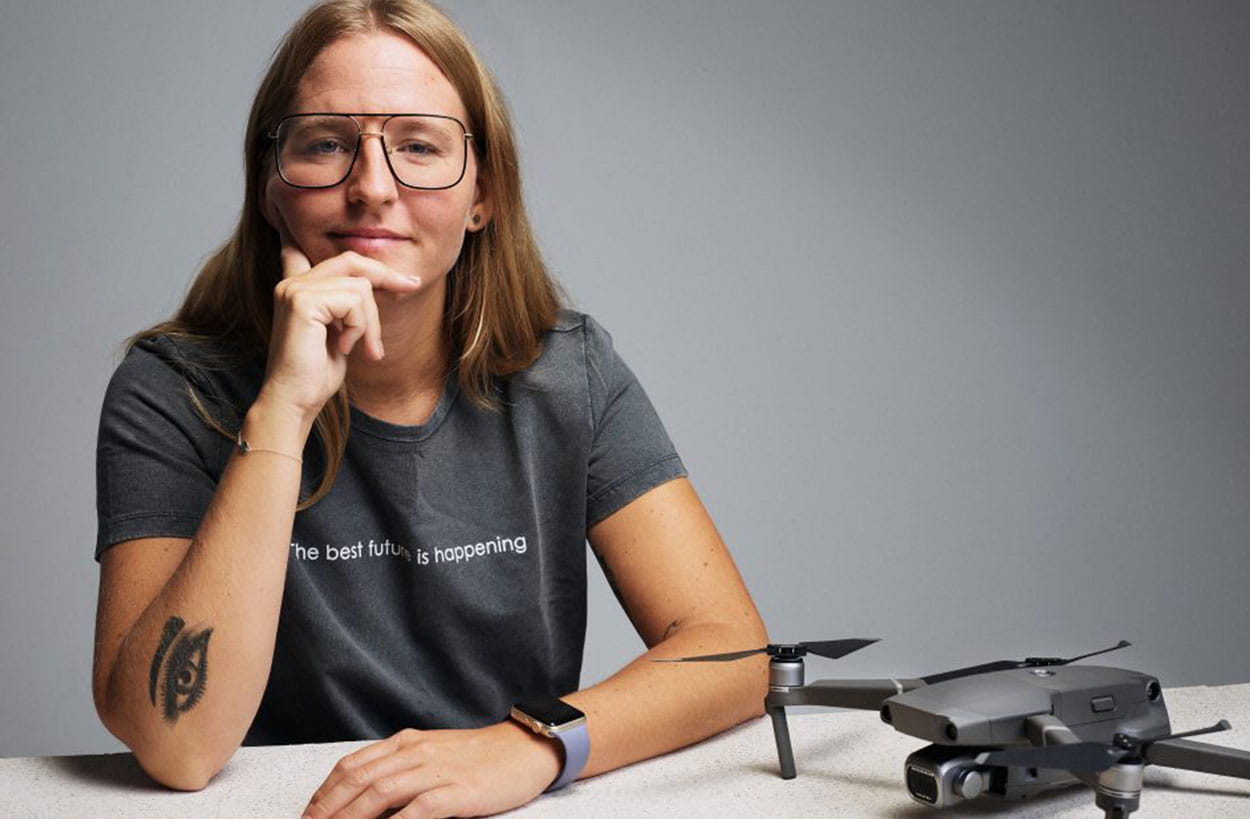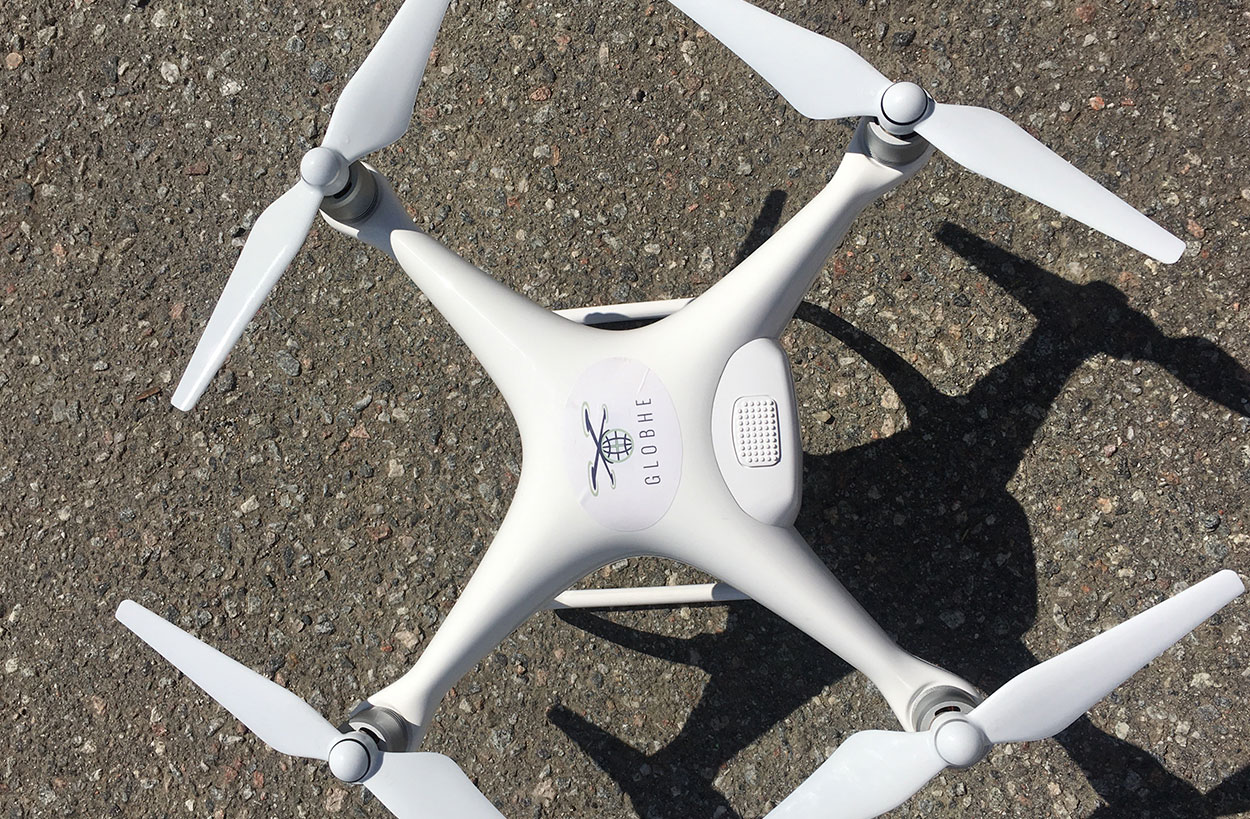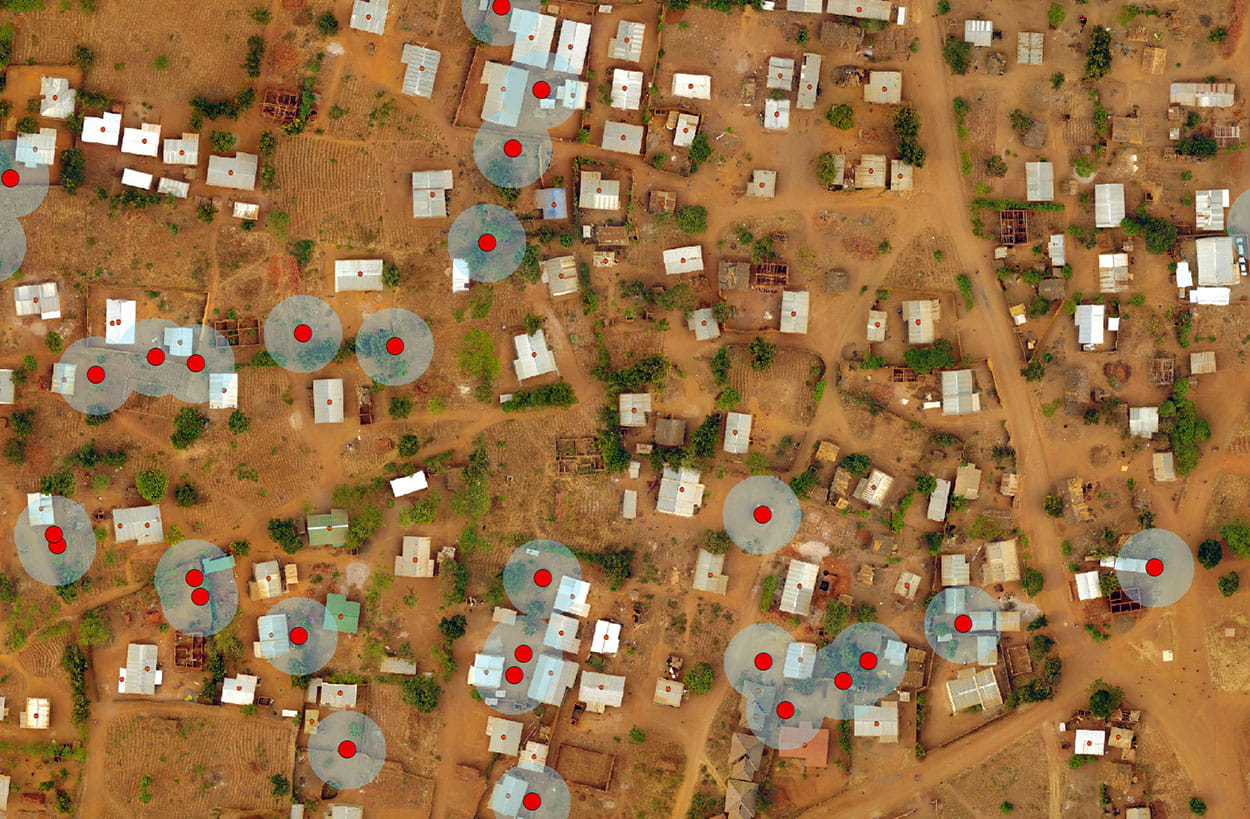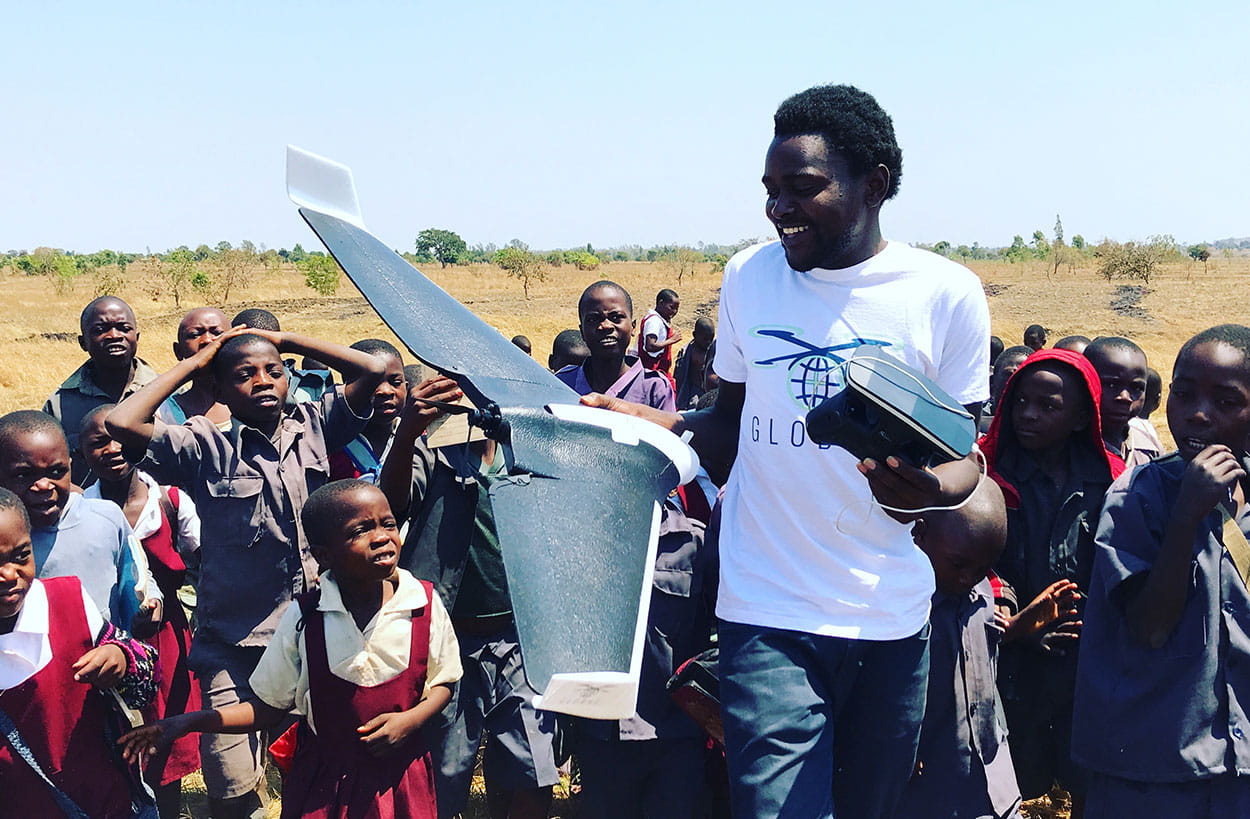An interview with Helena Samsioe,
CEO and Founder of GLOBHE
In the wake of COVID-19, we have seen a plethora of tech providers and innovators step up to assist in efforts to mitigate the pandemic sweeping every nation and community around the world . But what of the role of drones and Artificial Intelligence? Is there a way for these tools to make a key difference? We sat down for an interview with Helena Samsioe, CEO and Founder of GLOBHE, and recent winner of the 2020 Zayed Sustainability Prize in the Health Category, for a better understanding of the Crowdroning service GLOBHE provides. As a first-of-its-kind AI-assisted global drone data platform for health disaster prevention and response, GLOBHE is uniquely equipped to provide crucial information such as drinking water availability, sanitation and hygiene, environmental pollution and chemical hazards. Helena elaborates on the importance of up-to-date population data in mitigating and preventing pandemics like the COVID-19 virus— and discusses the ways in which GLOBHE is using its Prize funds to scale up its capabilities to address potential disasters and disease outbreaks in the future.
1. Is GLOBHE currently involved in containing the spread of the COVID-19 virus, or in the steps being taken to ensure emergency response preparedness of governments, healthcare centres, and humanitarian organizations around the world? If not, in what capacity could GLOBHE’s drone and AI platform theoretically play a part in assisting global efforts toward this end?
Our drones require visual characteristics in order to be of assistance, such as being able to spot a malaria mosquito breeding site before a malaria outbreak occurs. As such, GLOBHE is currently not directly involved in the COVID-19 response. That being said, we are currently witnessing the spread of COVID-19 in more low-income countries, and our service can provide critical support to these locales by facilitating a more efficient response to COVID-19 through the updated population and geographical data our drone platform produces. As an agile start-up that is ready to assist when and where needed, we are currently in conversations with these countries, in order to be able to offer our service with the cooperation and permission of their local governments.
In previous disease outbreaks for example, our service has been used to update population data in areas where population data is unknown/outdated, and to identify risk zones such as water and sanitation sources as well as identifying access to health centres. This type of information is key for governments, healthcare centres and aid relief organisations to properly plan and respond to pandemics. For the time being, we continue working on helping to prevent the next disease outbreak and to giving paid drone flying missions to our global network of drone pilots to help fuel the gig economy.
2. How prepared is GLOBHE to mobilize its drone assets for medical supplies and imagery data, in support of a wider outbreak of the virus in some remote areas across the world?
GLOBHE used to provide two drone services to prevent and respond to disease outbreaks and natural disasters around the world. These are (1) drone delivery and (2) data collection. Over time, we found scaling the medical drone service to be more difficult due to regulatory frameworks and the fact that our Crowddroning service already serves as a platform to tap into drones that currently exist in the hands of skilled drone pilots – meaning we didn’t have to ship new drones to areas of need along with the skilled personnel. Instead, the Crowddroning setup works well for drones that collect image data, as those types of drones are widely available around the world today and many are skilled to operate these. This setup did not work as well for drones to deliver medical supplies, as those types of drones are larger, more expensive and more complex to operate. There are very few of them out there, and few people are trained to fly them. This reality led to GLOBHE deciding to focus on the drone data collection service, to prevent and respond to disease outbreaks around the world. Today, we are well-equipped to do that with over 3,700 drone pilots in 52 countries available to collect drone data when a request is made through our Crowddroning platform.
3. As an organization, how closely do you work or align your global outreach efforts with international bodies and authorities such as the WHO?
We work closely with several UN organizations and aim to increase the coordination even further during 2020, as more organizations have become aware of the value our service brings. We are seeing our end-users move from testing of drone technology to implementation at an increased rate.
4. Can you share some relevant examples of other recent disease outbreaks that GLOBHE has had a key role in tackling? What kind of impact has GLOBHE achieved to date?
GLOBHE was recently involved in the 2017-2018 cholera outbreak in Malawi where the number of people living in the affected area was unknown due to old data, so it was difficult to plan the Cholera response and further prevention mechanisms. Our service was employed to provide an updated drone map consisting of over 50,000 drone images over the risk area and its surroundings, where households and potential contaminated sources such as water and sanitation points were automatically marked and counted through AI. This allowed us to provide UNICEF and the Malawi Ministry of Health with updated data so the response to the outbreak could be planned for more efficiently. To date, 100,000 people were assisted in the cholera and malaria epidemics of Malawi and Lake Victoria.
5. Are there any disaster relief lessons to be learned from the way the current crisis is being handled on both a local and global level? For example: can you identify any countries that have been especially effective at limiting the fatalities and containing the spread, and how so?
The world has once again, been reminded of the value of prevention instead of response, and it remains to be seen if we will really learn this time or keep neglecting investment into efficient prevention methods. I think it is too early to tell which countries are being most efficient in combatting COVID-19, as we are experiencing different exposure dates and curves due to that.
6. How is GLOBHE using its 2020 Zayed Sustainability Prize award to enhance or scale up its capabilities to address potential disasters or disease outbreaks in the future?
At GLOBHE we are making technical developments and updates to our Crowddroning platform that will enable for automation and scaling to a higher degree, which in turn will allow us to assist in the prevention and response of future disasters and outbreaks to a higher degree. An example of this is that we are currently manually matching our drone map requests coming in from end users around the world to the most suitable drone pilot available. This is something that our platform will be able to do automatically and/or give automated suggestions.
7. On a broader industry level, how do you see the future of drones in medical supplies and disaster relief planning?
So far, the biggest benefit we have seen is the capability of drones to quickly collect image data that serves as valuable insights in disaster relief and other related areas. The ability of drones to reduce transportation time of medical cargo delivery is also significant— but in many places, regulatory frameworks and lack of supportive infrastructure still hinder drone delivery at scale. Hence, the drone mapping industry is more mature, but I expect we will see drone delivery of medical supplies grow significantly over the next five years.
I think we are at a time where two big tech challenges need to be addressed that we already have started to see some solutions to: namely the limited battery life and the limited payload capacity of smaller drones. Besides that, I had hoped for regulatory frameworks to have been more developed by now – but it takes time. Nonetheless, 2020 is the year we are seeing interesting regulatory changes, not least with the European Union coming together with a joint legislative framework in July. I also think we are finally starting to leave the small pilot/test projects behind and move into more full-scale sustainable operations, which is a result of drone knowledge and the value the technology can bring becoming more widespread. Last, but not least, we are already seeing and will be seeing even more merging of technologies such as drones and AI.
8. What did we not ask you about that you would like people to know?
Our drones require visual characteristics in order to be of assistance, such as being able to spot a malaria mosquito breeding site before a malaria outbreak occurs. As such, GLOBHE is currently not directly involved in the COVID-19 response. That being said, we are currently witnessing the spread of COVID-19 in more low-income countries, and our service can provide critical support to these locales by facilitating a more efficient response to COVID-19 through the updated population and geographical data our drone platform produces. As an agile start-up that is ready to assist when and where needed, we are currently in conversations with these countries, in order to be able to offer our service with the cooperation and permission of their local governments.
In previous disease outbreaks for example, our service has been used to update population data in areas where population data is unknown/outdated, and to identify risk zones such as water and sanitation sources as well as identifying access to health centres. This type of information is key for governments, healthcare centres and aid relief organisations to properly plan and respond to pandemics. For the time being, we continue working on helping to prevent the next disease outbreak and to giving paid drone flying missions to our global network of drone pilots to help fuel the gig economy.
If there are any drone pilots reading this article, we invite you to sign up to become a freelance drone pilot for GLOBHE at www.globhe.com to help us prevent and respond to disasters around the world. Also, if there are any potential end-users reading this, feel free to place a map request at www.globhe.com or reach out to globhe@globhe.com for any questions you might have, and we will be happy to provide more information. We are constantly looking for new partners and ways to help make this world a better place.
.svg?iar=0&hash=670E3638BC16C0DD69B262DD1184DEA8)





